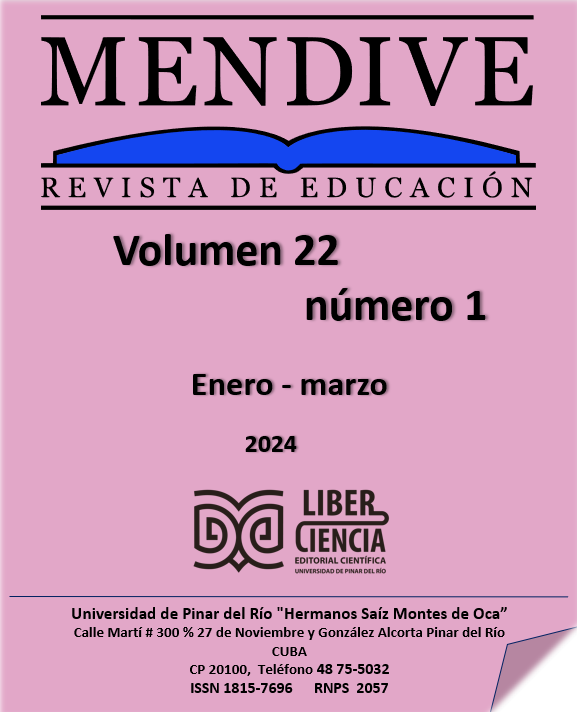Self-reflection. A connection point between the interior and the professional development of the sports teacher
Main Article Content
Abstract
Self-reflection is an important part of the continuous improvement process itself, to understand why and how decisions are made. The sports teacher must take the time to look at himself, and his work offers him the opportunity to recognize strengths and challenges and to improve his skills. The article aimed to socialize self-reflection as a way to establish cognitive relationships that are revealed in the process of professional improvement of sports teachers. It showed a triad between professional improvement, self-reflection and sports professionals, for their professional and personal performance, as it allows them to instruct and educate athletes in pedagogical activity, which is manifested by integrating knowledge and raising it to the level of professional application, mastering the technique to stay updated, investigate, know how to establish links with the social context and management of human and material resources. Scientific methods such as documentary analysis, process observation, survey and methodological triangulation were used, with descriptive mathematics the collected information was tabulated. The main result is the necessary and rapid intervention in the preparation and updating of a new sports professional: reflective, competent, critical, which requires developing alternative thinking through constant improvement in the current issues of his specialty; At the same time, it promotes self-reflection to judge professional activity, determine successes and errors, achieve their involvement to act on the change of their points of view, work styles and modes of action.
Downloads
Article Details

This work is licensed under a Creative Commons Attribution-NonCommercial 4.0 International License.
References
Arboix, J., Buscà, B., Aguilera, J., Fort, A., Trabal, G. y Peña, J. (2021). Competitive Balance in Male European Rink Hockey Leagues. Apunts Educación Física y Deportes, 145, 33-38. https://doi.org/10.5672/apunts.2014-0983.es.(2021/3).145.05
Arriagada, G.L., Haas, V., Cárdenas, M.K. (2021). Autorreflexión en el proceso docente: propuesta para su medición desde el modelo SIC. Revista Recus. Publicación Arbitrada Cuatrimestral. Edición Continua. UTM Ecuador, 6(2)- 17-24 http://revistas.utm.edu.ec/index.php/Recus
García, T.R., Moreno, M., Cuesta, L.A. (2019). Estudio sobre la superación profesional de los profesores de voleibol de la EIDE de Pinar del Río. Ciencia y Deporte, 4(1)-19-32 http://revistas.reduc.edu.cu/index.php/cienciaydeporte/
García, A., Ortega, E. y Palao, J. M. (2020). Game phase's performance in men's volleyball: from initial to top-level categories. RICYDE. Revista Internacional de Ciencias del Deporte. 61(16), 257-266. https://doi.org/10.5232/ricyde2020.06102
Gavilán, D., Martínez, R. (2020). El pensamiento abierto activo para promover competencias de investigación en los futuros maestros. En: Roig-Vila, Rosabel (ed.). La docencia en la Enseñanza Superior. Nuevas aportaciones desde la investigación e innovación educativas. Barcelona: Octaedro, 11(2), 1044-1052.
Méndez, J. M., y Conde, S. (2018). La autorreflexión inicial: una estrategia para la mejora de la práctica docente. Revista Electrónica Interuniversitaria de Formación del Profesorado, 21(1), 1731. https://doi.org/10.6018/reifop.21.1.270591
Montero, J. A. y Barbod, S. (2001). The problem with doping from sport sociology. A theoretical frame of analysis. Apunts. Educación Física y Deportes, 64, 54-62
Naranjo, J. A., Báez, O. L., Delgado, A., Álvarez, K. y Martínez, N. E. (2018). Formación de habilidades profesionales en los estudiantes de medicina en la Atención Primaria de Salud. Revista de Ciencias Médicas de Pinar del Río, 22(3), 120-130.
Nieva, J. A., y Martínez, O. (2016). Una nueva mirada sobre la formación docente. Revista Universidad y Sociedad, 8(4), 14 http://scielo.sld.cu/scielo.php?script=sci_arttext&pid=S2218-36202016000400002&lng=es&tlng=es
Pajuelo, A. y Caparrós, T. (2021). Acute:Chronic Workload Ratio. Exploration and Applicability in Women's Amateur Football. Apunts Educación Física y Deportes, 145, 25-32. https://doi.org/10.5672/apunts.2014-0983.es.(2021/3).145.04
Peña, I., Javaloyes, A. y Moya, M. (2022). "Rol de Estudiante-Entrenador/a como método activo en el aprendizaje en educación superior: Un estudio longitudinal". RICYDE. Revista Internacional de Ciencias del Deporte. 70(18), 235-246. https://doi.org/10.5232/ricyde2022.07003
Santaya, M. O., Breijo, T. y Piñero, I. (2018). Bases teóricas del proceso de desarrollo de habilidades profesionales pedagógicas. Revista Conrado, 14(64), 54-62.
Rodríguez, H. (2021). El desempeño profesional del profesor deportivo en la Iniciación Deportiva Escola. Efdeportes Lecturas: Educación física y deportes, 22(237)
Torres, I.L, León, L.L. y Hernández, M.C. (2022). La preparación de los profesores deportivos para dirigir el proceso de iniciación deportiva. Arrancada, 22(41) https://revistarrancada.cujae.edu.cu
Vivanco, G. y Sarango, J. (2019). Las habilidades pedagógicas profesionales en los estudiantes de la educación superior. Revista Conrado, 15(67), 341-348.


